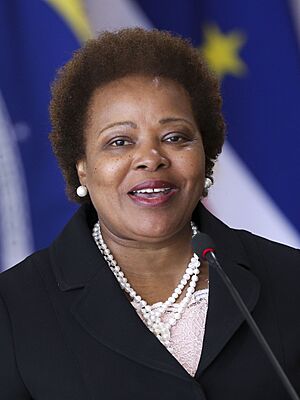Maria do Carmo Silveira facts for kids
Quick facts for kids
Maria do Carmo Silveira
|
|
|---|---|

Silveira in 2017
|
|
| 7th Executive Secretary of the Lusophone Commonwealth |
|
| In office 9 January 2017 – 1 January 2019 |
|
| Preceded by | Murade Isaac Murargy |
| Succeeded by | Francisco Ribeiro Telles |
| 13th Prime Minister of São Tomé and Príncipe |
|
| In office 8 June 2005 – 21 April 2006 |
|
| President | Fradique de Menezes |
| Preceded by | Damião Vaz d'Almeida |
| Succeeded by | Tomé Vera Cruz |
| Personal details | |
| Born | 14 February 1961 Portuguese São Tomé and Príncipe |
| Political party | Social Democratic Party |
| Alma mater | Donetsk National University |
Maria do Carmo Trovoada Pires de Carvalho Silveira, born on February 14, 1961, is an important political figure from São Tomé and Príncipe. She served as the 13th Prime Minister of her country from June 8, 2005, to April 21, 2006. She also held a key role in the Lusophone Commonwealth.
Contents
Early Life and Education
Maria do Carmo Silveira was born in what was then Portuguese São Tomé and Príncipe. She studied economics at the Donetsk National University in Ukraine. Later, she earned a Master's degree in Public Administration from the National School of Administration in Strasbourg, France.
Role at the Central Bank
Before becoming Prime Minister, Maria do Carmo Silveira was the governor of São Tomé and Príncipe's Central Bank. She held this important position twice. Her first term was from 1999 to 2005. She returned to lead the Central Bank again from 2011 to 2016.
Time as Prime Minister
Maria do Carmo Silveira became the Prime Minister of São Tomé and Príncipe on June 8, 2005. She also served as the Minister of Planning and Finance during her time in office. She was the second woman in her country to hold the position of Prime Minister.
Political Party and Goals
She is a member of the Movement for the Liberation of São Tomé and Príncipe-Social Democratic Party (MLSTP-PSD). She was also part of the party's main leadership team. As Prime Minister, her main goal was to bring stability to the country's economy.
Key Achievements
During her time as Prime Minister, Maria do Carmo Silveira achieved several important things. She helped resolve disagreements over wages with public sector unions. She also secured financial help from the International Monetary Fund (IMF). Additionally, she reached an agreement with Angola to work together on oil-related matters.
After Her Term
Her time as Prime Minister ended after the parliamentary elections in 2006. In those elections, the opposition party won against her party, the MLSTP-PSD. She was then succeeded by Tomé Vera Cruz as Prime Minister.
Leading the Lusophone Commonwealth
In January 2017, Maria do Carmo Silveira took on another significant international role. She became the Executive Secretary of the Lusophone Commonwealth (CPLP). This organization connects countries where Portuguese is an official language. She followed Murade Isaac Murargy from Mozambique in this role. Her term as Executive Secretary ended in January 2019, when Francisco Ribeiro Telles from Portugal took over.
See also
 In Spanish: Maria do Carmo Silveira para niños
In Spanish: Maria do Carmo Silveira para niños
- Politics of São Tomé and Príncipe

